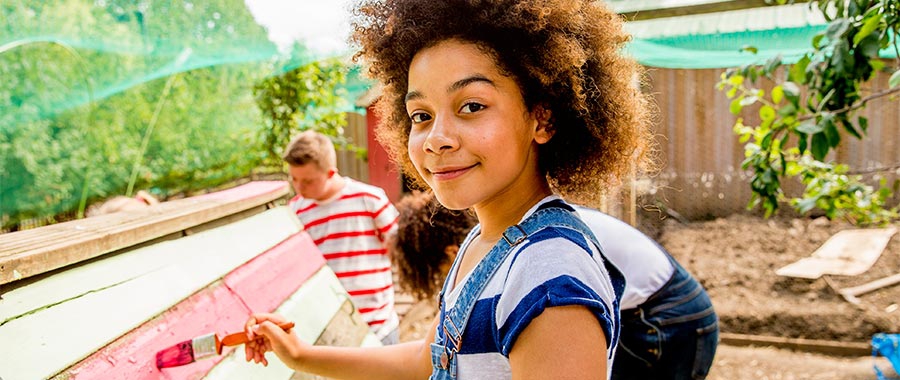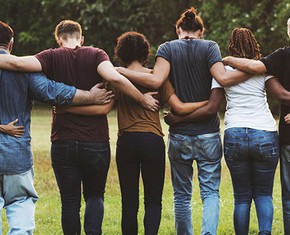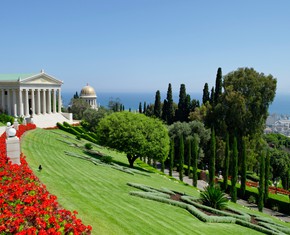The views expressed in our content reflect individual perspectives and do not represent the authoritative views of the Baha'i Faith.
You could tackle the world’s problems using many different strategies, so why do Baha’is focus on community-building?
Followers of the Baha’i Faith all around the world, along with their friends from diverse backgrounds and religions, engage in a process called “community building.” Through activities such as children’s classes, groups for teens, prayer gatherings and study groups open to anyone and everyone, they work to share the message of the Baha’i teachings in a supportive, diverse and joyful environment—teachings such as:
Be generous in prosperity, and thankful in adversity. Be worthy of the trust of thy neighbor, and look upon him with a bright and friendly face. Be a treasure to the poor, an admonisher to the rich, an answerer to the cry of the needy, a preserver of the sanctity of thy pledge. Be fair in thy judgment, and guarded in thy speech. Be unjust to no man, and show all meekness to all men. Be as a lamp unto them that walk in darkness, a joy to the sorrowful, a sea for the thirsty, a haven for the distressed, an upholder and defender of the victim of oppression. Let integrity and uprightness distinguish all thine acts. – Baha’u’llah, Gleanings from the Writings of Baha’u’llah, p. 285
Through study of these writings, and acts of selfless service inspired by the concepts learned, these activities engage different demographics of the population in conversations about their spiritual nature, their purpose in life and their identity as a community that should be unified in its diversity. Baha’is and their friends of different ages, races and socio-economic backgrounds put great effort into keeping these activities thriving all around the world.
But why focus on community building? Surely there are many different ways to serve. Why don’t Baha’is redirect their energies to things that are already in place, such as soup kitchens, non-profit organizations or charity events? Surely that is more practical?
Abdu’l-Baha, the son of the Founder of the Baha’i Faith, wrote about the importance of aiming towards spiritual development, rather than only focusing on material progress:
… although material civilization is one of the means for the progress of the world of mankind, yet until it becomes combined with Divine civilization, the desired result, which is the felicity of mankind, will not be attained.
Material civilization is like a lamp-glass. Divine civilization is the lamp itself and the glass without the light is dark. Material civilization is like the body. No matter how infinitely graceful, elegant and beautiful it may be, it is dead. Divine civilization is like the spirit, and the body gets its life from the spirit, otherwise it becomes a corpse. It has thus been made evident that the world of mankind is in need of the breaths of the Holy Spirit. Without the spirit the world of mankind is lifeless, and without this light the world of mankind is in utter darkness. – Abdu’l-Baha, Selections from the Writings of Abdu’l-Baha, p. 303.
The Baha’i Faith’s approach towards building a better society aims to tackle the problems that lie beneath the more obvious ones. Instead of focusing only on material circumstances, it focuses on the very agents of change: the people themselves.
The Baha’i writings say, “Regard man as a mine rich in gems of inestimable value. Education can, alone, cause it to reveal its treasures, and enable mankind to benefit therefrom.” (Baha’u’llah, Tablets of Baha’u’llah, p. 162.) And so, community building efforts center on education; not purely a material education—although that’s important, too—but also a spiritual education.
Through the exploration of spiritual topics, children, youth and adults equip themselves with tools that many of us struggle to find in the modern world, such as patience, compassion, and a sense of genuine love and responsibility towards our neighborhood. In a society that struggles so much with feelings of decreased self-worth, lack of identity, no sense of agency or “fitting in”, these qualities become an important asset to solve problems that could not be solved with money or material goods.
Feeding a person is certainly important, because we should eradicate hunger, but it’s only through education and a genuine exploration of our reality, working together, that we can eradicate the elements that create circumstances of hunger: a lack of compassion among the privileged, decreased self-worth among the underprivileged, and the absence of unity that could bring the two together.
This does not mean that Baha’is do not participate in efforts to eradicate material problems in society. The Baha’i teachings encourage everyone to be active in their community and work hard to solve both the spiritual and material problems of our age. But while we join others and help feed the hungry, clothe the needy and heal the sick, we try to keep sight of the real underlying problem: the lack of a sense of community that can break the cycle of suffering across all circles.
For many of us, starting our own activities in our communities, often alone or in small teams, can seem daunting. After all, it can be challenging to start something from scratch. But investing time and effort in community building is ensuring an excellent framework around which we can find solutions to the needs of a community—solutions that aren’t formulaic, and that take into account the particular circumstances of a place. Through the study of spiritual concepts, a community discovers their hidden capacities that can be channeled towards helping those around them. And so, through acts of service, great material change can be achieved.
But most importantly, these acts are evidence of a much bigger change: a new way of thinking developed through community building activities. Acts of charity will not be isolated events to make us feel good about ourselves: they are a part of a planned effort on behalf of everyone in the community, to improve everyone’s way of life both material and spiritually.
The happiness and pride of a nation consist in this, that it should shine out like the sun in the high heaven of knowledge… And the honor and distinction of the individual consist in this, that he among all the world’s multitudes should become a source of social good. Is any larger bounty conceivable than this, that an individual, looking within himself, should find that by the confirming grace of God he has become the cause of peace and well-being, of happiness and advantage to his fellow men? – Abdu’l-Baha, The Secret of Divine Civilization, pp. 2-3.
















Comments
Sign in or create an account
Continue with Googleor